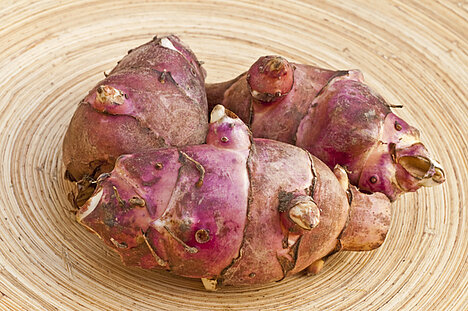Inulin

Inulin is a natural dietary fiber found in many plants. It is one of the so-called prebiotics that promote the growth of beneficial bacteria in the gut. Inulin can therefore support your dog's digestion and immune system. But how exactly does inulin work and what advantages and disadvantages does it have for dogs? In this article, you'll find out everything you need to know about inulin for dogs.
What is inulin and how does it work?
Inulin is a carbohydrate that consists of several fructose molecules. It is used by plants as an energy store and is found, for example, in chicory, artichokes, Jerusalem artichokes and dandelions. Inulin is indigestible for humans and dogs, meaning that it reaches the large intestine unchanged. There it serves as food for the bacteria living there, especially bifidobacteria. These bacteria produce short-chain fatty acids that protect the intestinal wall and have an anti-inflammatory effect. They also lower the pH value in the intestine and thus inhibit the growth of harmful bacteria.
Inulin therefore has a positive effect on your dog's intestinal flora and intestinal health. A healthy intestinal flora is important for digestion, nutrient absorption, defense against pathogens and regulation of the immune system. Inulin can also help to stabilize blood sugar levels as it delays the absorption of glucose in the small intestine. Inulin can also increase the feeling of satiety and thus prevent obesity.
What are the benefits of inulin for dogs?
Inulin can have various benefits for dogs, depending on what ailments or needs they have. Here are some examples:
- Inulin can help dogs with digestive problems such as diarrhea, constipation or bloating by balancing the intestinal flora and stimulating bowel movement.
- Inulin can help dogs with allergies or skin problems by strengthening the immune system and reducing inflammation.
- Inulin can help dogs with diabetes or obesity by regulating blood sugar levels and reducing hunger.
- Inulin can help older dogs by improving bowel function and reducing the risk of bowel disease.
What are the disadvantages of inulin for dogs?
Inulin is generally well tolerated by dogs, but as with any dietary supplement, there are some potential downsides or side effects. Here are some examples:
- Inulin can cause gastrointestinal distress in some dogs, especially if they have a sensitive digestive system or are given too much inulin at one time. Symptoms may include diarrhea, bloating or abdominal pain.
- In some dogs, inulin can lead to an overgrowth of bacteria in the small intestine, which can lead to impaired nutrient absorption or bacterial overgrowth. Symptoms may include weight loss, loss of appetite or vomiting.
- Inulin can cause an allergic reaction in some dogs, especially if they have an intolerance to certain plants. Symptoms may include itching, skin rash or difficulty breathing.
Inulin is an indigestible carbohydrate that is found in various plants and can have a positive effect on the intestinal flora of dogs. It promotes the growth of healthy bacteria, protects the intestinal wall, regulates blood sugar levels and can prevent obesity. Inulin can help dogs with digestive problems, allergies, diabetes, obesity and old age. Possible disadvantages are gastrointestinal problems, bacterial overgrowth or allergic reactions, especially in sensitive dogs.
If you notice any signs of hypersensitivity or poisoning in your dog, you should see your vet immediately. We are not a substitute for a vet, but we try to be as accurate as possible. Every dog reacts differently and we recommend you get a second opinion or consult your vet if in doubt.
Stay healthy and take good care of your four-legged friend!😊
Similar to Inulin
Feeding FOS can have various health benefits for dogs: They promote the growth of good gut bacteria and inhibit the growth of harmful bacteria. This reduces the formation of toxins in the...
Galactooligosaccharides (GOS) belong to the family of prebiotics, special fibers that promote the growth and activity of beneficial bacteria in the intestine. They are obtained by the hydrolysis of...
Acacia fiber, or acacia gum, is a soluble dietary fiber extracted from the resin of certain species of acacia trees. These trees are native to Africa, Australia and India. The fiber is known for its...
Pectin is a plant polysaccharide found in the cell walls of fruit and vegetables. It is a natural gelling agent that is released when fruit is cooked or frozen. Pectin is often used as an additive...



